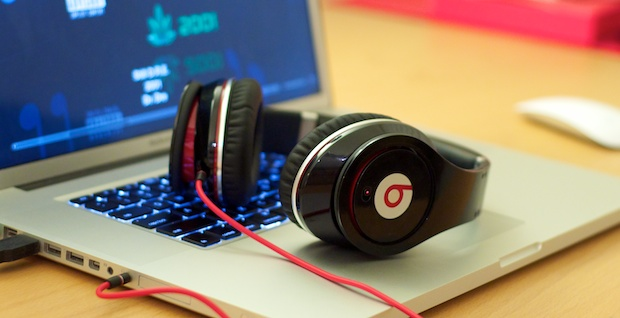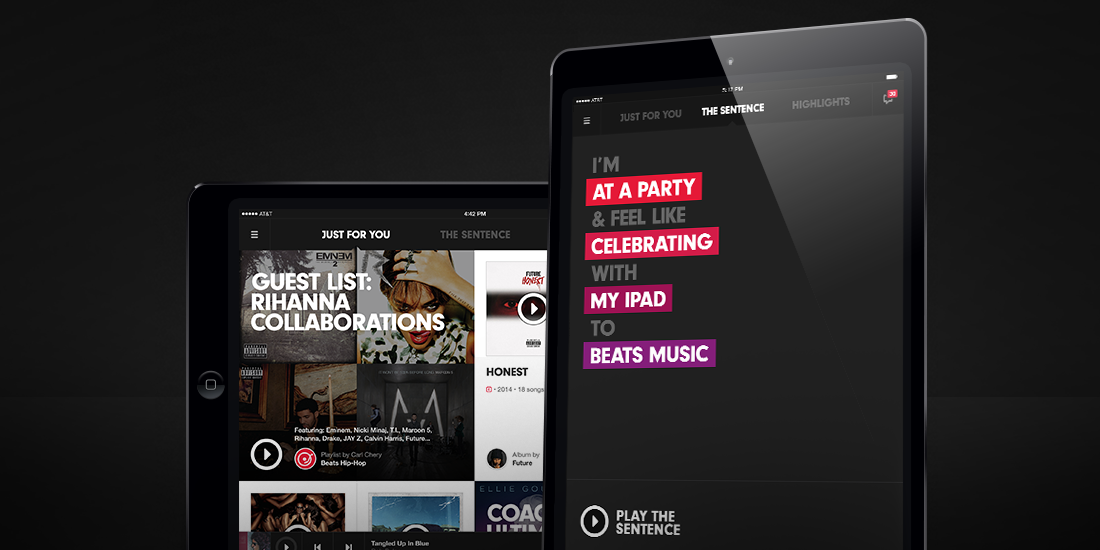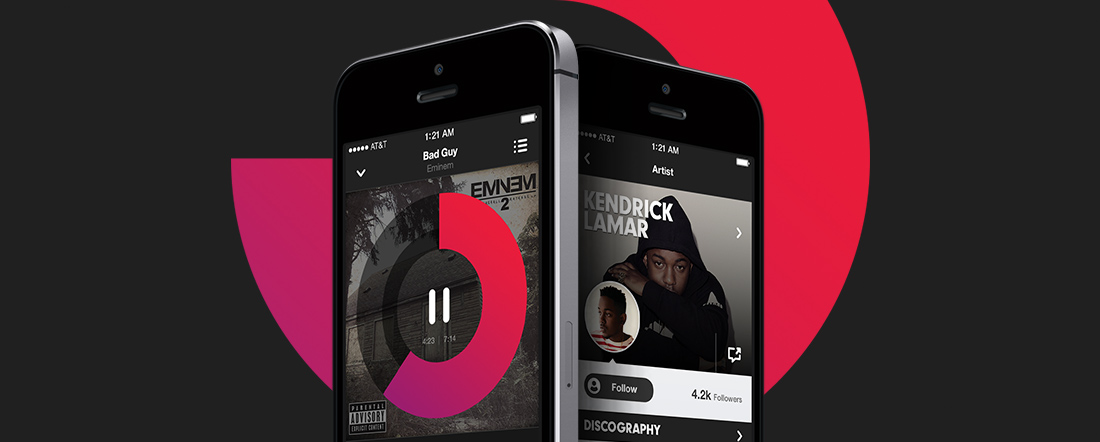Apple's newly announced $3 billion acquisition of Beats Music and Beats Electronics has received a generally warm response from prominent analysts on Wall Street, who believe the purchase could help Apple compensate for shrinking digital music sales on the iTunes Store.
Apple made it clear in announcing the purchase on Wednesday that the Beats Music streaming subscription service was key to its interest in the company, while the headphone making side of the business will live on under Apple's direction. But Beats Music is seen as complementing the existing iTunes Store and iTunes Radio, offering a new service that was not previously available from the company's offerings.
Analysts on Wall Street accordingly focused on the acquisition of the Beats Music service in their reactions, and most came away with a positive feeling about the $3 billion deal.
Morgan Stanley
Analyst Katy Huberty sees Apple's purchase of Beats as a "low-risk, potentially high-return deal." She noted that Beats' device business is seeing strong growth of 30 percent per year, and believes the high margins justify Apple's acquisition price.
But it's the subscription music service that could make the Beats deal a home run, Huberty said. She believes every 1 percent penetration of Apple's 800 million active user accounts equates $960 million in revenue.
"Apple believes Beats offers the right strategy for streaming music as it leverages both algorithms and 200 human curators to create playlists, which differentiates it from competitors," Huberty wrote. "Apple plans to monetize the service with aggressive subscriber growth (from 250K today) and become profitable over the long term."
J.P. Morgan
While analyst Rod Hall believes the $3 billion final cost is "pricey," he isn't concerned about how much Apple is willing to pay, as the company is sitting on a massive $133 billion cash pile.
"Rather, it is about what Apple can do to with Beats Music to revitalize their own music business," Hall wrote. "We also see the addition of Dr. Dre and Jimmy Iovine to the musical network and creativity they bring as a positive for Apple."
Hall noted that iTunes content sales declined about 8 percent in calendar 2013, while his estimates suggest sales declined over 25 percent year over year in the second half of 2013 alone. In light of this problem, he sees the "innovative" Beats Music service as a potential solution.
In fact, Hall said he wouldn't be surprised to see Apple sell off Beats Electronics at some point in the future, allowing the headphone making side of the business to stand on its own while Apple would keep the talent and Beats Music service it has acquired.
 Photo via Paul Stamatiou.
Photo via Paul Stamatiou.RBC Capital Markets
Analyst Amit Daryanani also sees the Beats deal as a positive, adding to Apple's recurring revenue streams. Along with the Beats Music service, he's encouraged by the addition of Iovine and Dre to Apple's team, as well as the profitable headphone hardware, which he estimates brings in 70-plus-percent gross margins.
While analysts were skeptical at first, many have begun to see value for Apple in buying Beats, particularly through its subscription music service.
In order for the Beats acquisition to be viewed as a success, Daryanani believes Apple needs to see growth of iTunes sales and increased hardware sales from Beats. He also expects to see innovation in Apple's iTunes product line thanks to input from Iovine and Dre.
He noted that subscription-based music revenues were up 50 percent in 2013 to $1.1 billion. During that same period, sales of digital music fell 2 percent to $3.9 billion, representing the first decline in history.
Piper Jaffray
Gene Munster was originally confused by the Beats deal when rumors first surfaced, but like others, he's begun to warm up to the marriage with Apple. In particular, he believes that adding Iovine and Dre could "help propel Apple into the next level in its content offering, particularly in video."
Munster also noted that because the $3 billion Beats purchase is Apple's largest acquisition in history, it could open the door for other purchases, including potential Internet services outside of content.
As for the Beats headphone lineup, Munster believes Apple will be able to leverage its distribution channels to help the brand rapidly grow over the next few years.
Wells Fargo
Maynard Um views Apple's purchase of Beats as a defensive move, and it's not one that he entirely agrees with. In his view, Apple should be acquiring "more offensive assets to better position itself."
Um doesn't believe investors should be focused on accessory revenue from the Beats purchase, at least in the near term. And while he's intrigued by the music subscription business, the analyst said Beats lacks scale, and he's not sure it justifies the $3 billion valuation.
Um does, however, see value in the addition of Iovine to Apple's lineup, while the Beats design team could help Apple in the wearable devices market.
Evercore
Analyst Rob Cihra admitted the $3 billion price tag on Beats is "steep," but argued that "the cost of Apple not getting the next generation of music right would be much steeper."
He believes Beats headphones will add more than $1 billion in annual revenue for Apple, but like others, he sees the bigger factor in the deal being the addition of Iovine and Dre to Apple's team. In his view, both men bring with them "invaluable industry relationships" that could benefit Apple in content negotiations.
As for Beats Music, Cihra believes Apple was in a position where it needed an answer to subscription streaming service Spotify, and the Beats product fits that bill. While he admitted Beats Music is just getting started, he believes the purchase will provide Apple not only with established content deals, but also an option for split branding if it so chooses.
 Neil Hughes
Neil Hughes








-m.jpg)






 Charles Martin
Charles Martin
 Christine McKee
Christine McKee
 Wesley Hilliard
Wesley Hilliard
 Malcolm Owen
Malcolm Owen
 Andrew Orr
Andrew Orr
 William Gallagher
William Gallagher
 Sponsored Content
Sponsored Content








95 Comments
And I could find just as many who think this is a dumb idea. http://tinyurl.com/p5ltpy8 Gotta love spin. ;)
I can see some value in Iovine but what's the value of Dre? And no it's not because he's black.
I'm starting to warm up to this too as a stockholder. I'm now seeing all the possibilities of Apple's pieces coming together. Subscription based music thru iPhone, Macs, Apple's CarPlay, Satellite connected Headphones, etc. Combine this with an iCloud Subscription and I might actually sign up.
Well It's Called "Beats by Dr. Dre"
I really can't see why this is such a bad deal. When FB buys whatsapp for $19B or google buys Nest for around the $3B mark, no one seems to comment. The negative Apple press is curious. From what I've seen of the Beats subscription service I can see apple turning it into a great thing to complement iTunes song purchase model. Steve was right when iTunes first started saying people want to own their music, but now i think more and more ppl are happy to pay a small monthly fee to have access to a vast collection. Next for Apple should be a huge investment in Netflix! :)